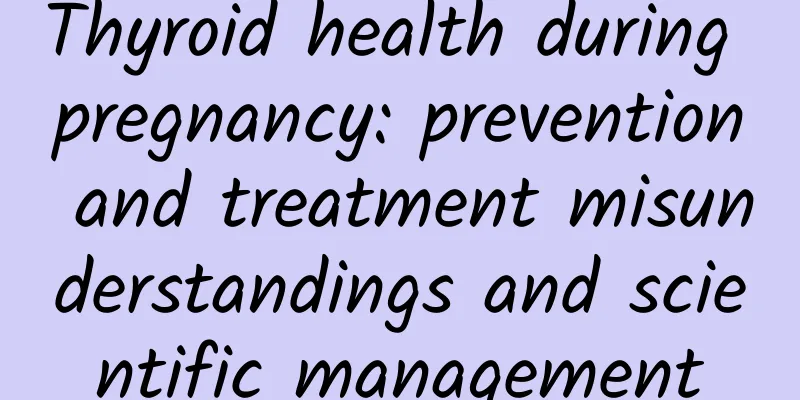Thyroid health during pregnancy: prevention and treatment misunderstandings and scientific management

|
Author: Yang Zhaojun, Chief Physician of China-Japan Friendship Hospital Reviewer: Wu Xueyan, Chief Physician, Peking Union Medical College Hospital Thyroid disease during pregnancy not only affects the mother’s health, but can also adversely affect the growth and development of the fetus, so it is important to understand and properly manage these conditions. 1. Precautions for thyroid disease during pregnancy Thyroid diseases during pregnancy mainly include hypothyroidism and hyperthyroidism. If these diseases are not treated promptly and effectively, they may cause a series of adverse effects on the mother and fetus, such as miscarriage, premature birth, and intellectual development disorders of the fetus. Therefore, special attention should be paid to the following points during pregnancy: First of all, it is very important to take the medicine consistently. Whether it is hypothyroidism or hyperthyroidism, patients should use the medicine reasonably under the guidance of a doctor and should not stop taking the medicine or change the dosage without authorization. Thyroid hormone replacement drugs represented by Euthyrox have no obvious adverse effects on the fetus at a reasonable dose, but instead help to protect the health of the mother and fetus. Secondly, regular testing of thyroid function is key. As pregnancy progresses, hormone levels will continue to change, so pregnant women need to go to the hospital regularly for thyroid function tests so that they can adjust the dosage of medication in time to ensure that thyroid function is within the normal range. In addition, dietary adjustments should not be ignored. Pregnant women should follow the principle of appropriate iodine intake, neither too much nor too little. Due to the increased synthesis of thyroid hormones, increased renal iodine excretion and fetal iodine needs during pregnancy, the iodine requirement of pregnant women is significantly higher than that of non-pregnant women. Pregnant women with hyperthyroidism should appropriately increase their iodine intake during pregnancy to meet the needs of fetal growth and development; while pregnant women with hypothyroidism need to arrange iodine intake reasonably under the guidance of a doctor. To assess whether iodine intake is appropriate, you can measure the iodine content in your morning urine. The World Health Organization recommends a urine iodine concentration range of 150 to 250 micrograms per liter during pregnancy. If the urine iodine level is within this range, it indicates that iodine intake is moderate. Figure 1 Original copyright image, no permission to reprint 2. Prevention and misunderstanding of thyroid disease during pregnancy To prevent the occurrence of thyroid diseases during pregnancy, we need to take a multi-faceted approach. First of all, keeping a calm mind and a good emotional state are essential to maintaining thyroid function. Because thyroid disease is closely related to genetics and autoimmune disorders, and emotional tension, anxiety and other factors may induce or aggravate the disease. Therefore, pregnant women should try to avoid mental stimulation during pregnancy and maintain a positive and optimistic attitude. Secondly, a proper diet is also one of the important measures to prevent thyroid disease. Pregnant women should pay attention to a balanced diet and eat a moderate amount of iodine-rich foods, such as kelp, seaweed and other seafood. At the same time, avoid eating foods and drugs that may cause goiter. However, there are still some misunderstandings in the process of understanding thyroid diseases during pregnancy. For example, some pregnant women stop taking medication without authorization because they are worried that the medication will have adverse effects on the fetus; or they adopt extreme diets because they are not clear about iodine intake. These practices are wrong. Pregnant women should establish a correct concept of the disease, use medication scientifically and eat a reasonable diet under the guidance of a doctor to ensure the health of the mother and the fetus. 3. Effects of thyroid disease on the human body and management of special populations Thyroid disease affects the human body in many ways. In addition to the adverse effects on pregnancy mentioned above, abnormal thyroid hormones may also lead to a series of systemic symptoms, such as palpitations, hand tremors, weight changes, etc. In addition, thyroid disease also has a certain genetic susceptibility, but it is not a hereditary disease in the traditional sense. Therefore, even if there is a family history of thyroid disease, people do not need to worry too much, just need to strengthen monitoring and management during pregnancy. Figure 2 Original copyright image, no permission to reprint For women with thyroid nodules, whether they can get pregnant is a common question. Generally speaking, as long as the nodules function normally and are benign lesions, they will not have much impact on pregnancy. However, pregnant women still need to follow up regularly to monitor changes in nodules to ensure safety during pregnancy. If the nodules are suspected to be malignant or functionally abnormal, appropriate treatment measures should be taken according to the specific situation. |
>>: Monkeypox outbreak has once again raised the alarm. Here’s what you need to know →
Recommend
Warning! A woman's vision dropped to 0.1 after using expired eye drops. Don't use expired eye drops anymore!
Xiao Zhao (pseudonym), a 29-year-old female offic...
How to regulate amenorrhea caused by polycystic ovary
In traditional Chinese medicine, it refers to ter...
What to check at 24 weeks of pregnancy
After a woman becomes pregnant, she needs to unde...
Is it okay to drink motherwort during pregnancy?
Pregnant mothers are the greatest, and the excite...
How long does it take for lochia to be discharged after delivery?
Mothers have normal physiological needs for lochi...
How many times a week should pregnant women eat avocado?
Sugar-apple is a food with a high fat content, so...
Is the Arctic inhabited? What is the biggest difference between the Antarctic and the Arctic?
In nature, both the South Pole and the North Pole...
Can pregnant women eat goose eggs cooked with mugwort leaves?
Mugwort and goose eggs are two common foods in pe...
What to do if you dream of being pregnant and having a miscarriage
Many pregnant mothers often dream about being pre...
What to do if the mother has high blood sugar
For family members, pregnant women are the ones w...
Is it suitable to drink coffee during menstruation?
There are many female friends around me who like ...
Five months after giving birth, blood streaks in the vagina
Because many gynecological diseases can cause blo...
Is it OK to swim with a tampon inside?
Due to physiological reasons, women will have men...
How to distinguish between menopause and pregnancy
Many women have trouble differentiating between m...
Why is my period black?
Menstruation always troubles many women, especial...









